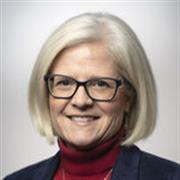
Robin Taylor Wilson
Biography
Dr. Wilson is an environmental cancer epidemiologist by training with experience in transdisciplinary implementation research. She directs the Kidney Cancer Research Prevention Program at Temple University. Her research focuses on the intersection between genetic and environmental factors influencing kidney cancer risk, including trace element exposures and vitamin D metabolism. This research has identified cancer and health effects associated with environmental exposure to heavy metals, gene x environment interactions, dietary exposure pathways in mining-impacted areas, and new biomarker assay and assessment techniques. Dr. Wilson has led or contributed to published research conducted among diverse population groups in the United States (American Indian/Alaska Natives, African American, rural Appalachian), Bolivia (Spanish and Quechuan), Central/Eastern Europe, Finland and Sweden. Her work has been funded by the American Institute for Cancer Research (AICR), United States (U.S.) Centers for Disease Control and Prevention (CDC), U.S. National Institutes of Health (NIH), the U.S. Naval Health Research Center, the U.S. Food and Drug Administration (FDA), Pennsylvania State University (PSU), and Pennsylvania Department of Health (PA DOH).
In professional service, Dr. Wilson is a collaborating member of the Cancer Prevention and Control Program for the Temple Fox Chase Cancer Center and serves as a board member of the International Network for Epidemiology in Policy (INEP), a consortium of 24 epidemiologic professional associations worldwide. Dr. Wilson has served on public health, research, award and/or career panels for the APHA, North American Congress of Epidemiology, NIH, PA DOH, PSU, Temple University, U.S. Department of Defense, and Worldwide Cancer Research.
In her educational role, Dr. Wilson has had the honor of serving as a mentor for 85 students and faculty from diverse cultures and racial/ethnic backgrounds. She was named Outstanding College of Medicine Mentor and the Inaugural College of Medicine Dean's Diversity Award Champion by PSU. She developed the NIH-funded Technology-Linked Epidemiology Education Network (TEEN), in partnership with Thinkdemic, to develop a new blended-learning platform designed to increase scientific self-efficacy.
Dr. Wilson’s trainees have been admitted to academic posts, fellowships, and/or employment with Jefferson University, Johns Hopkins, Mayo Clinic, Mount Sinai Hospital, the National Cancer Institute, PA DOH, PSU, Public Health Management Corporation, Stanford, Temple University, University of Buffalo, University of Colorado, University of Delaware, University of Pittsburgh, University of Wisconsin, University of Texas, U.S. Food and Drug Administration, Vanderbilt University and Yale University.
Education
- PhD, Epidemiology, University of Iowa
- MA, Geography, University of Colorado
- BS, Political Science, Drake University
Courses Taught
|
Number |
Name |
Level |
|---|---|---|
|
ENVH 2102 |
Environmental Health |
Undergraduate |
|
ENVH 5004 |
Environmental Health |
Graduate |
|
CHP 3386 |
Diamond Peer Teachers - Internship II |
Undergraduate |
|
EPBI 8213 |
Cancer Epidemiology |
Graduate |
|
EPBI 8402 |
Intermediate Concepts and Methods in Health Research |
Graduate |
|
EPBI 9289 |
MPH Fieldwork I |
Graduate |
Selected Publications
-
Cuffee, Y.L., Wang, M., Geyer, N.R., Saxena, S., Akuley, S., Jones, L., & Wilson, R.T. (2022). Vitamin D and family history of hypertension in relation to hypertension status among college students. J Hum Hypertens, 36(9), pp. 839-845. England. doi: 10.1038/s41371-021-00577-6
-
Smith, M.Y., Hogan, S., Jack, S.M., Wilson, R.T., & Oremus, M. (2022). The case for using mixed methods for designing, implementing, and disseminating evidence-based interventions for public health practice. J Public Health Policy, 43(2), pp. 292-303. England. doi: 10.1057/s41271-022-00343-z
-
Wu, H., Weinstein, S., Moore, L.E., Albanes, D., & Wilson, R.T. (2022). Coffee intake and trace element blood concentrations in association with renal cell cancer among smokers. Cancer Causes Control, 33(1), pp. 91-99. Netherlands. doi: 10.1007/s10552-021-01505-2
-
Stallworth, A.M., Chase, E.H., McDevitt, B., Marak, K.K., Freedman, M.A., Wilson, R.T., Burgos, W.D., & Warner, N.R. (2021). Efficacy of oil and gas produced water as a dust suppressant. Sci Total Environ, 799, p. 149347. Netherlands. doi: 10.1016/j.scitotenv.2021.149347
-
Raynes-Greenow, C., Gaudino, J.A., Wilson, R.T., Advani, S., Weiss, S.H., Delaimy, W.A.l., & Policy, I.N.f.E.i.n. (2021). Beyond simple disclosure: addressing concerns about industry influence on public health. BMJ Glob Health, 6(2). England. doi: 10.1136/bmjgh-2020-004824
-
Oremus, M., Taylor-Wilson, R., Aldrich, M., Bell, K., Gaudino, J., Palevsky, S., Payne, J., Raynes-Greenow, C., Sim, F., Smith, M., Weiss, S., & Zhang, Y. (2021). The role of epidemiologists in SARS-CoV-2 and COVID-19 research. Public Health, 190, pp. e3-e4. Netherlands. doi: 10.1016/j.puhe.2020.10.006
